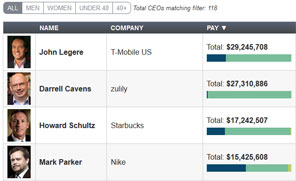Originally published Saturday, June 21, 2014 at 6:00 PM
Investors speaking up on executive-compensation packages
By many measures, executive pay continues to rise, especially among the largest public companies. But the dynamics between public-company boards and their shareholders have clearly changed, and performance outcomes are sometimes surprising.
Special to The Seattle Times
Pulling away: 5 highest-paid CEOs
Stock benefits separated the highest-paid executives of Northwest public companies from the rest.

1John Legere, T-Mobile US
2Darrell Cavens, zulily
3Howard Schultz, Starbucks
4Mark Parker,
Nike
5Spencer Rascoff, Zillow
1John Legere — T-Mobile US
2013 total pay: $29.2 million
Cash pay: $6.6 million
Equity pay: $22.5 million
Market cap (12/31): $29.97 billion
Profit FY 2013: $35 million
Number of employees: 40,000
2Darrell Cavens — zulily
2013 total pay: $27.3 million
Cash pay: $350,000
Equity pay: $26.9 million
Market cap (12/31): $5.13 billion
Profit FY 2013: $12.9 million
Number of employees: 1,110
3Howard Schultz — Starbucks
2013 total pay: $17.2 million
Cash pay: $3.7 million
Equity pay: $13.3 million
Market cap (12/31): $59 billion
Profit FY 2013: $8.3 million
Number of employees: 182,000
4Mark Parker — Nike
2013 total pay: $15.4 million
Cash pay: $7.1 million
Equity pay: $7.7 million
Market cap (12/31): $69.3 billion
Profit FY 2013: $2.5 billion
Number of employees: 48,000
5Spencer Rascoff — Zillow
2013 total pay: $10.6 million
Cash pay: $473.570
Equity pay: $10.1 million
Market cap (12/31): $3.2 billion
Loss FY 2013: $12.5 million
Number of employees: 817
Source: Equilar and SEC documents
Illustration: David Miller / The Seattle Times
More
![]()
Earlier this year Expeditors International, the Seattle-based logistics company, put its executive-pay package to an advisory vote of the shareholders. The measure had passed handily the previous year, so the company’s compensation committee assumed investors were behind the plan.
They weren’t.
Investors pummeled the pay package, with nearly 56 percent of the shares cast against it. At a time when most compensation plans get favorable majorities, Expeditors’ shareholders sent the company an unmistakable message: Fix it.
In the Northwest and throughout the nation, investors are flexing their muscles in the long-running debate over executive pay through say-on-pay votes, a byproduct of federal reforms after the 2008 financial collapse.
The votes are nonbinding, but the changes are significant, experts say. Say-on-pay votes are spurring more talks over CEO pay between public companies and their shareholders. Board of directors are demanding more information and measurements for executive pay. Increasingly, companies are replacing the gray language of their proxy statements with attractive graphics and clear writing that make compensation information more accessible to outsiders.
Corporate boards are moving away from CEO rewards that shareholders often frown upon, such as executive perks and generous severance packages. Instead, more boards are focusing on salaries, bonuses and stock awards designed to put their CEOs and shareholders on the same page.
“Shareholder engagement is at an all-time high,” said John Roe, executive director of ISS Corporate Services, a Rockville, Md., consultant that provides advice and research to investment advisers.
He said “shareholder pressure is probably the No. 1 reason” why corporate boards are designing better executive-pay packages.
The changes are occurring against the backdrop of a volatile debate over the concentration of wealth. Every well-compensated CEO, and the board he or she works for, knows that they run the risk of being portrayed as an example of the rich getting richer.
The changes may not lead to a lasting rollback of executive pay sought by some critics. By many measures, executive pay continues to rise, especially among the largest public companies.
But the dynamics between public-company boards and their shareholders have clearly changed, and performance outcomes are sometimes surprising. Among Northwest public companies, for instance, shareholder returns outperformed the executives’ compensation in 2013.
Median CEO pay for public companies based in Idaho, Oregon and Washington increased 13.6 percent to $1.6 million last year, according to inflation-adjusted data gathered for The 2014 Seattle Times/Equilar CEO compensation study. The comparison between 2012 and 2013 isn’t perfect because some companies and CEOs either landed on or dropped off the list from one year to the next.
Investors with shares in Northwest public companies fared better, by one measure. The median increase in total shareholder returns for Northwest public companies was 34.8 percent last year, according to Bloomberg data, while the Standard & Poor’s 500 index last year jumped 26.
T-Mobile US CEO John Legere topped the NW group with cash and equity awards worth $29.2 million last year. Rounding out the top five were: Darrell Cavens at zulily receiving $27.3 million; Howard Schultz, Starbucks, receiving $17.2 million; Mark Parker, Nike, $15.4 million; and Spencer Rascoff, Zillow, $10.6 million. (See details in Sunday Business section.)
The recent falling out between Expeditors and its shareholders over executive pay wasn’t caused by stock awards; the disagreement was apparently over bonuses.
The company last year paid Peter Rose — its co-founder, chairman and CEO at the time — a modest salary of $110,000 and an equally modest stock option valued at $60,800. Other Expeditors executives were paid almost the same amounts.
The real money came in the form of an annual bonus based on the company’s operating income. Under that formula, Expeditors awarded $5.4 million to Rose, while other senior executives received payouts ranging from $2.7 million to $5 million, according to the company’s proxy report.
Some outside observers found Expeditors’ pay package troubling.
“I look at this and think, ‘What were they thinking?’ ” said Fred Whittlesey, principal of Compensation Venture Group, a Bainbridge Island consulting firm. He said the company’s pay package was weighted far too heavily toward rewarding executives for short-term instead of long-term results.
More red flags went up when the board gave Rose a $7.9 million going-away bonus payable after his planned retirement as CEO on March 1 of this year. Rose stayed on as chairman.
ISS, the Maryland research firm, called Rose’s two bonuses — worth a combined $13.3 million — an “outsized overall pay package.” It urged Expeditors’ shareholders to reject the company’s compensation plan, and they did.
“This is a company that is likely getting the message that they need to rethink what executive compensation should be,” Whittlesey said.
On May 12, five days after the annual meeting, Expeditors announced that Rose had stepped down as chairman and had resigned from the board, ending his 25-year career with the company. The Expeditors’ news release said Rose did not want to overshadow the new executive team.
In a regulatory filing the following week, Expeditors said its board and executives “are looking very carefully at the provisions of the executive-compensation program, taking into account observations and feedback shared by our shareholders.” A company spokeswoman declined to provide additional comment.
Shareholders also rejected the executive-pay package for Dendreon, the Seattle-based biotech.
Investors cast only 40.6 percent of their shares in favor of Dendreon’s plan. It was the lowest percentage of the 62 Northwest public companies that had disclosed say-on-pay results as of June 3.
Dendreon investors may be more frustrated with the company’s performance than its pay package, Whittlesey said. Dendreon reported a net loss of $296.8 million last year, bringing its accumulated deficit to $2.3 billion on Dec. 31, according to the company’s annual report.
In a statement, Dendreon said, the company has taken note of the vote and will consider shareholder feedback. (On June 9, Dendreon CEO John Johnson said he’s stepping down Aug. 15.)
With say-on-pay votes firmly in place, and investors paying attention to executive compensation, more public companies are taking the initiative by explaining their pay packages to shareholders.
Starbucks disclosed that its “engagement team” had meetings last year with seven large shareholders to talk about executive pay, disclosure and corporate governance.
“Companies are doing a lot more active shareholder outreach, not just when the proxy is released, but throughout the year,” said Greg Arnold, a senior consultant with the SemlerBrossy Consulting Group in Los Angeles.
The AFL-CIO Office of Investment in Washington, D.C., has noticed the change. The labor organization wants to narrow the income gap between senior executives and line workers, and is itself an investor.
“We’re finding that companies are engaging us much more as shareholders,” said Vineeta Anand, the office’s chief research analyst. “Five years ago, nobody would even want to engage with us.”
None of this is making it any easier for directors — and especially board-compensation committees.
“I think there’s a public perception that there’s rubber stamping going on,” said Beth Wright, a senior consultant with the Seattle office of Towers Watson who has seen board deliberations over pay. “That’s certainly not my experience.
“I’ve seen very robust and even contentious discussions about executive pay.”
George Erb is a Seattle freelancer.
 Four weeks for 99 cents of unlimited digital access to The Seattle Times. Try it now!
Four weeks for 99 cents of unlimited digital access to The Seattle Times. Try it now!

















